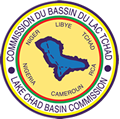22 May, 1964 – 22 May 2021: LCBC at 57!

Exactly 57 years ago, more precisely on 22 May 1964, in the then Fort Lamy, four visionary leaders (Ahmadou Ahidjo, Diori Hamani, François Tombalbaye and Sir Abubakar Tafewa Balewa, respectively Presidents of the Federal Republic of Cameroon, the Republic of Niger, the Republic of Chad and Prime Minister of the Federal Republic of Nigeria) signed the quadripartite convention establishing the Lake Chad Basin Commission (LCBC).
The convention delineates the vast area which covers Lake Chad. At the time, it covered more than 25,000 km2 and included tributaries and a relatively unknown groundwater table. In 1964, when LCBC was established, the basin covered an area of some 437,000 km2, almost the size of Cameroon. In 1994, when the Central African Republic (CAR) joined the organisation, the area more than doubled to reach 967,000 km2. This is what specialists, in their jargon, call the “conventional basin of Lake Chad” or active basin. It is the area of intervention of LCBC.
The Commission is a permanent consultation and cooperation organisation responsible for the harmonious management of water and other environmental resources of Lake Chad among the six-member countries (Cameroon, Niger, Nigeria, Chad, CAR and Libya). The “hydrographic basin of Lake Chad” encompasses the Sahelian shores of various countries (Algeria, Libya, Chad, Niger, Nigeria, Cameroon, CAR) with almost 2,382,000 km2.
Located at a pivotal between white and black Africa, West and Central Africa, and the Sahel and the Sahara, Lake Chad is at the heart of a region characterised by rampant desertification and unbridled population growth. Droughts and climate change make the Lake vulnerable to the rainfall regime, contributing to the variation of its level. The notably flat nature of the topography of its basin causes spectacular movements.
Since the 1960s, its waters have dropped dramatically, reducing this magnificent body of water visible from the atmosphere to a mere fraction. Climatic and anthropogenic pressures of all kinds threaten to wipe this rare blue resource off the map. In addition, since 2015, there has been violence from terrorist groups such as Boko Haram and the Islamic State in West Africa (ISWAP). The conflict, which began with Boko Haram attacks in northern Nigeria in 2009, gradually spread to other countries bordering Lake Chad, causing more than 40,000 people’s death and forcing nearly three million others to flee their homes. The violence has created one of the worst humanitarian crises globally, threatening the existence of over forty million people who depend on the Lake for their food, fishing, livestock, and agriculture.
The COVID-19 pandemic has equally not spared the Lake Chad region, which is an important biodiversity hotspot. From December 2019 onwards, the pandemic spread like wildfire around the world. For the Lake Chad Basin region, as well as its member states, the impacts of this pandemic are not only sanitary but also socio-economic. Faced with disruption of economic activities, including agricultural production, food security, cross-border trade, tourism, foreign investment flows, macroeconomic stability, peace and security, member states, faced with budgetary difficulties, have also had to cope with the expenses in the fight against this pandemic. The pandemic threatens the progress made in the area, aggravates existing inequalities, and worsens existing hunger, malnutrition, and vulnerabilities.
Notwithstanding these challenges and instabilities affecting the region, worsening the already daunting challenges, LCBC, true to its mandate and missions, with the unwavering determination and commitment of the Heads of State and Government of member states, has stayed the course.
In these troubled waters and pitfalls of all kinds, the organisation has not relented to promote regional cooperation, solidarity, and integration among its member states and populations. Despite these daunting challenges, the organisation, now 57 years old, has been successfully achieved great things for the benefit of its member countries and peoples.
The challenge for the future of the Commission is to keep its head above waters, to remain a unique basin organisation that ensures adequate monitoring, early warning, and identification of new challenges promptly to enable its member countries to collectively respond in keeping with its founding ideals of solidarity, cooperation, and integration.
The Commission’s goal is to continue developing a stable, secure, peaceful region with the well-being of communities guaranteed so that present and future generations can benefit from the tremendous resources of the region.
On behalf of the member states of LCBC, the populations of the Lake Chad Basin and all who continue to work tirelessly with courage and self-sacrifice towards the development of the Lake Chad Basin Commission and the Lake Chad Region, I wish us all a happy and prosperous Founders Day.
Happy 57th Anniversary!
The Executive Secretary
